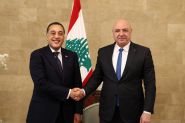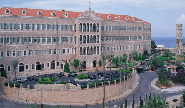As the new year draws near, we spoke with residents from several neighborhoods across Beirut. Most carry heavy hearts, voicing a profound sense of apprehension. Though they all speak of “hopes for peace” and a revival of Lebanon’s prosperity, few appear to truly believe in it.
As we wander through the bustling streets of Basta al-Tahta, lined with small shops, it is easy to forget that this neighborhood paid a heavy price before the ceasefire was reached between Israel and Hezbollah on November 27. Yet, the harsh reality quickly reasserts itself.
Illegal Weapons: A Persistent Wound That Dims Hope
With graying hair and a weary expression, Ali firmly believes that Iran “has destroyed our country and the entire region.” For him, the only way forward is for Tehran “to be brought to its knees, with Khamenei at its helm,” he declares resolutely.
Mosbah, nostalgic for a bygone era, reflects, “This neighborhood is where I grew up. It was once a big and mixed village, and life was good. Today, it’s all gone,” he laments. As the third-generation owner of Farchoukh Juice, a well-known local juice shop, he strikes a slightly more hopeful note. “I want to believe in a better future, but pessimism dominates. Despite the ceasefire, as long as illegal weapons continue to circulate, I don’t have hope for anything,” he confesses.
Meanwhile, Anthony, a 23-year-old culinary influencer from Ain al-Remmaneh, remains hopeful. He dreams of a Lebanon “finally free, sovereign, and, above all, liberated from all its chains.”
Only a Strong, Principled and Sovereign President Can Alter Lebanon's Future
As for the presidential election, scheduled for January 9 after more than two years of deadlock, Mosbah remains skeptical. “Even if it happens, it will change nothing,” he says, disillusioned, feeling as though he now lives “in a giant prison.”
On the other hand, Moustafa, also a resident of Basta al-Tahta, holds out hope for a strong president who would “stand at the top of the pyramid.” “We need a decisive leader who can unite all Lebanese,” he asserts with conviction. “The problem is not the Lebanese people. They love and help each other,” he adds, referring to the solidarity displayed during the war. The true obstacle, according to Moustafa, lies in the political parties that divide the people. For him, the priority is to elect a president “who is purely Lebanese and who will only defend the interests of his country.”
Tony, the owner of the clothing store, Uneffected, located at the Ain al-Remmaneh-Chiyah junction, shares the same hope. His wish for 2025? “For business to pick up.” Unfortunately, he had little luck, opening his store just days before the conflict between Israel and Hezbollah erupted over a year ago. “I'm just one street away from Chiyah, where we've endured very tough moments marked by airstrikes and destruction,” he recalls, especially since the war began in this area on September 23, 2024.
Juliette, a 43-year-old mother of three, couldn’t hold back her tears when we met her at Sassine Square, in the heart of Achrafieh. She is exhausted from juggling three jobs to support her family. What she hopes for most is “good health” to keep going, and, above all, “a decent salary” to cover her growing bills for rent, electricity, and water, which have become exorbitantly high since the onset of Lebanon's economic crisis in 2019, amid the stark absence of the Lebanese State and subsidies.
Her solution to break free from this dire situation? “We need a president who is not part of this clique, someone who will understand the concerns of the people, the poor before the rich,” she declares. Does she have a potential presidential candidate who could meet her wishes? “I don't! And if such a person existed, they'd be killed before they could take office. That's Lebanon!”, she concludes, disillusioned by a history marred by political tragedies and assassinations.
Fearing War’s Return, Clinging to Hope for Peace
Moni has lived in Ain al-Remmaneh-Chiyah for thirty years. “We’ve lived through the entire war; we can't endure it anymore,” says the grandmother, her smile unwavering despite the haunting memories of bombings and destruction. Her wish for 2025? “Peace for all.”
This hope is shared by Michele and Ivan, two physiotherapy students we met in the heart of Ashrafieh, and by Hiba, from Noueiri, whom we encountered while clearing out her late father’s electronics shop in Basta.
At an age when hope should be a given, Jinane, a rock-inspired resident of Furn al-Chebbak, holds no illusions. “This truce is just a temporary pause; the war will resume,” she says, anxiety evident as she waits for her taxi.
Even Juliette, though she fears “the war will resume after New Year’s Eve, a war that doesn’t concern us directly,” remains steadfast, stating, “I stand with the Lebanese Army and my country, and I am nonpartisan.”
However, we close 2024 on a note of hope, thanks to Tony, an optimistic man in his forties. He emphasizes, “We must wish for the best in 2025, regardless of our political, regional, or sectarian affiliations. We’re entering a better phase – it can’t be worse than what we’ve already endured.”
“We hope this is the end, the last war, and that this ceasefire turns into real peace,” concludes Tony, smiling.
A lasting peace, and a true rule of law – free, sovereign, independent, and prosperous. This is what we all hope to see realized in 2025.





Comments